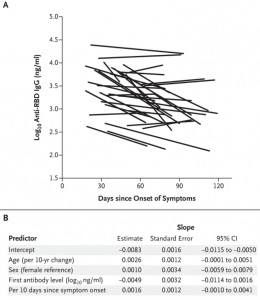
Longitudinal Assessment of Anti–SARS-CoV-2 Receptor-Binding Domain IgG in Persons Who Recovered from Covid-19. (A) Shows log-transformed IgG concentrations plotted against the time since the onset of symptoms in each participant (n=34). (B) Shows a linear regression model that was created to estimate the effects of the participants’ age and sex, the days from symptom onset to the first measurement, and the first measured log10 antibody level on the slope reflecting the change in anti-RBD antibody levels (in log10 ng per milliliters per day). CI denotes confidence interval. (Source: Ibarrondo et al., 2020. NEJM)
A recent correspondence in NEJM shows that antibodies to SAR-CoV-2 wane rapidly in mild disease, raising the question around the durability of potential protective immunity. Blood samples were analysed longitudinally in 30 patients with mild disease from 37 days after the onset of symptoms to a mean of 86 days (ranging from 44 to 119 days). Infections were confirmed using RT-PCR in 30 of the 34 pariticipants. IgG concentrations were quantified using an adapted enzyme-linked immunosorbent assay (ELISA), that detected concentrations of anti–SARS-CoV-2 spike receptor-binding domain IgG. Using linear regression models the estimated half-life was approximately 36 days (range of 26 to 60 days).
Journal Article: Ibarrondo et al., 2020. Rapid Decay of Anti–SARS-CoV-2 Antibodies in Persons with Mild Covid-19. NEJM
Summary by Clive Gray










